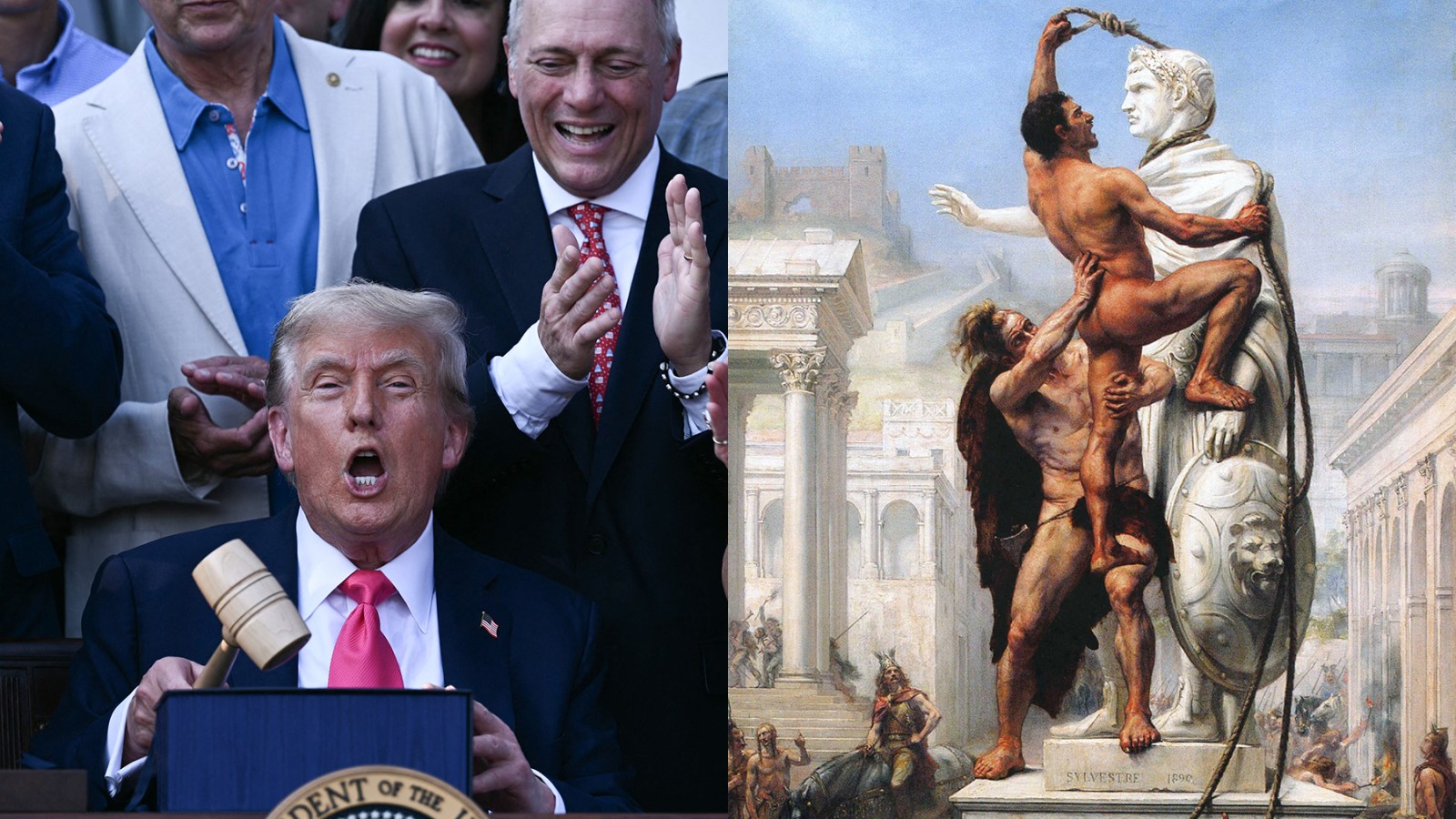Weather Report #31: On the Fall of the American Empire, Eight Years Since Hurricane María, News Media's Failure to Use the Word 'Genocide', Political Violence and Lists, And Springfield, Ohio
Consuming 10/06/2025

Hello, dear reader! Welcome to your Weather Report, a weekly column where I recommend some articles, a book, a movie, and some music for readers to consume.
You'll have noticed that there wasn't a Weather Report in your inbox last Sunday or the one before that. My apologies, but I've been getting accustomed to some new work stuff (that you can hear more about below) that left me with little energy for the newsletter. I'm not going to tell you 100% that it won't happen again, but I'm going to try very hard not to let that be the case. Yes. I do need to get better at organizing myself. I'm working on that.
Anyway, because I've missed two Sundays, you're getting a Giant-Size Weather Report today with about 7,600 words' worth of my opinions. Here's what's in this issue:
- Nonprofit funding surged after Hurricane María, allowing many groups to create programs that they never would have dreamed.
- More about my new job and some stories to come.
- Essays, articles, and columns about: the fall of America, Hurricane María's eighth anniversary, the American Gestapo and their lists, and Springfield, Ohio.
- A contemporary spy novel obsessed with disinformation campaigns, and a great, literary detective novel that gripped me immediately.
- One of the best movies of the year, and an underrated sci-fi thriller.
- Five indie songs I've had on repeat the whole week.
If you're interested in seeing the recommendations – and supporting Heavy Weather's quest to keep tabs on collapse – you can become a paid subscriber by clicking the button below. Paid subscribers get access to the MEDIA LIST, a comprehensive list of every book, movie, and video game I've ever recommended. If you're already a paid subscriber, thank you very much! This newsletter would literally not be possible without your support.
What I Did This Week:
New Article on Nonprofits
Hurricane María's eighth anniversary was on Sept. 20, and the archipelago is somewhat better off but it is still decades from ever returning to what it once was, if it ever does. To mark the anniversary, friends-of-the-newsletter 9 Millones published my investigation into how the nonprofit sector has changed since then. About $375 million came into Puerto Rico between 2017 and 2018. While that type of post-disaster funding typically drops off after the news cycle passes on. However, Puerto Rico was a little bit different because of the scale of the disaster, and several other crisis that would hit the archipelago a few years later, like earthquakes and the pandemic.
However, that fateful night of September 20, 2017, which many experts described as a “before and after” in the nation’s history, was not the only socio-political upheaval to come. Puerto Ricans, fresh off 15 days of rage that unseated a governor, were literally shaken to their core by a series of earthquakes that displaced nearly 50,000 people in January of 2020. Two months later, those who still had homes then endured nearly two years confined indoors due to the COVID-19 pandemic, only to encounter the devastation of Hurricane Fiona two years later. Between 2021 and 2024, Puerto Rico’s electrical grid also became the worst in the United States, according to the U.S. Energy Information Administration.
“The different emergencies open some funding opportunities for soliciting funds that, when you’re not in a state of emergency, you have no way of soliciting. Suddenly, we were in one state of emergency after another for quite a while. When we were closing down María’s opportunities, we were already talking about earthquakes, then COVID, then Fiona,” Frontera said.
You can read the full story here:

New Job as an Editor
This was announced last night, so I can finally share here. But I've signed up as the deputy editor for The Latino Newsletter. This is a super huge honor, particularly because if Julio had not taken on my pitch about Luma protests during the summer of 2021, I would not be a journalist right now. I've already edited two pieces that are up on the site right now (here and here), and there are going to be a lot of more interesting stories to come. I'm also going to be doing a little bit of reporting in my new role. Essentially, I'm going to be documentsmaxxing on main. My first article as deputy editor debuts this week, so stay tuned for more!
You can find the full announcement here:
https://thelatinonewsletter.org/p/the-latino-newsletter-secures-major-grant-puerto-rico
The Fall of the American Empire
I think it's pretty clear to most everyone involved (unless you're a rightwing nutjob), that the United States is past its prime. No. I'm not talking about that silly and false metric that empires only last ~250 years. However, the rot at the heart of the American empire has started to seep through to its outer layers, causing things many never thought possible to become everyday realities. A fascist president, masked thugs kidnapping people off the street, imploding the economy and the planet to talk to your AI girlfriend, etc... it's all happening here. So, the first thing I want to highlight in this link roundup is a great interview between Rolling Stone's Nikki McCann Ramírez and Mike Duncan, a historian best known for the Revolutions and History of Rome podcasts where they discuss whether or not we are witnessing the fall of the American empire. Although I've never listed to the latter, I'm a huge fan of the former, particularly its season on the Russian Revolution. Throughout the interview, Duncan gives a clear-eyed and even-handed view of what's going on in the States:
In 2025, it’s clear to Duncan that the American empire, which has dominated global geopolitics for the last century, has passed its zenith. Under the Trump administration, the devolution of the American ideal has accelerated in some ways that could only exist in the unique context of the current moment, and others that mirror the predictable, centuries old ouroboros of political power and decline.
“Everybody has a shelf life,” Duncan tells Rolling Stone. “Everybody has a lifespan, and eventually you do get into some sort of decline phase. The United States is still enormously powerful, we’re not on the verge of disappearing from the great power equations of the Earth, but is this thing pushing itself towards some sort of terminal failure? Yeah, sure feels like it.”
The interview stresses the necessity of looking at our modern context through a historical perspective. Although history doesn't repeat, you can draw astute similarities between different situations. In particular, Duncan points to fact that the Roman Republic became the Roman Empire gradually, over years and years not all at once. Things still looked somewhat the same from the outside but power began to coalesce around Augustus in similar ways to how the United State's power is coalescing around Trump, even if he is significantly less further along in the process.
From the outside, it still looked like the Republic was in place. So if we go this route, we’re going to have congresses, we’re going to have Supreme Courts, we’re going to have a President of the United States, there will be governors, there will be elections, it’s just what’s happening underneath that facade. The facade is never going to go away, it’s how tissue-thin the facade is.
Duncan notes that, internationally, the U.S. "torched so many allies going into Iraq," which led to Obama being elected in 2008 as a sort of political "correction." Not a radical change by any means, but a person who could be seen by allies of the country as a person worth listening to who wasn't going to fly off the handle like Bush, but would still continue the rules-based international order that people like Obama and his political circle believed in. That meant retiring boots on the ground but continuing a campaign of terror from the sky with drones. Obama's election functioned as a sort of release valve on the tension felt by the world's governments, who negotiated with Bush but felt him to be off kilter to neoliberalism. But then Trump comes along, blasting a lot of the goodwill the nation had left with its allies during his first term and destroying even more now.
It relieves us of our moral responsibility. But the Europeans and the world is, I think, ready for us to be okay — and then we vote in Trump. So now the rest of the world is looking at a country who, depending on how the next election goes, will not stay committed to anything that we’ve committed to in terms of treaty obligations, in terms of trade obligations, we’re just crazy. So there’s no rational reason to make long term deals with the United States anymore, or count on them in any way, shape or form.
The second point to all of this: We are still insanely rich, like insanely rich. We have so much wealth, power, and resources that even a stupid hulking thing that cannot be counted on is still a stupid hulking thing, and therefore around and in everything, no matter what.
So, even as the U.S. is destroyed from within, it will remain the lumbering American brute on the world stage, able to last out at anyone who Trump dislikes or merely the most recent target of one of his tantrums. At the current moment, I'm thinking of Trump taking away Colombian President Gustavo Petro's visa after he spoke at a Pro-Palestine demonstration and urged U.S soldiers not to commit war crimes, while Israeli Prime Minister Bibi Netanyahu is able to roam free even though his country is currently perpetrating a U.S.-backed genocide on Palestine.
You could also think about the Trump administration trying to go all in on fossil fuels at a global level even though most countries are moving towards renewables as another moment of the U.S. burning goodwill. By the way, a lot of that rhetoric is also a feeble attempt to turn many countries away from allying themselves with China, which is becoming the world leader on green energy. As many reports will tell you, much of the world is trying to avoid a confrontation with Trump by appearing to please the U.S. by giving him platitudes but doing whatever they think is best under the surface, hoping that the American giant will not put the Eye of Sauron on them if they manage to stay under the radar.
One last thing I want to mention about the interview before ending this section is how spot on Duncan was with talking about how much of the current U.S. government is composed of "court favorites," not anybody with any sort of genuine vision for the future:
What our government currently presupposes is, “What if everyone running the government was a court favorite?” At the level of court favorite: ability, intelligence, awareness of what’s going on, like, actually good ideas, they have none of these things. Our entire government is run by the court favorites. Instead of just having it be like one person who’s messing things up, it’s literally everybody.
If you want to read about one of Trump's most beloved court favourites, Gil Duran has a great essay in The New Republic about Peter Thiel and his obsession with the Antichrist.
Read the full interview between McCann Ramírez and Duncan here:

That's it for this week's free stuff. If you want to see the media recommendations and the link roundup, you can become a paid subscriber today.







